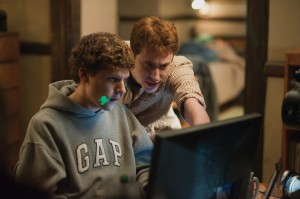Movie Review
‘The Social Network’
Jesse Eisenberg, left, and Joseph Mazzello in Columbia Pictures’ “The Social Network.”
However, the difference in how the two scenes end is startling. Franny ends up fainting under the weight of Lane’s narcissism. Erica skips that step and dumps Zuckerberg on the spot. It’s the last game he’ll lose in the movie.
In a surge of geek-fury, Zuckerberg codes a website at two in the morning. It compares two Harvard girls side-by-side and asks the visitor to choose which one is hotter, left or right. He calls it Face Mash, and it’s a spiteful act. But, like most of his cruel intentions, it gets him press, and with a little more time and money, he co-founds baby Facebook.
The film is framed by two simultaneous legal negotiations. In one, Zuckerberg is being sued by the chiseled Winklevoss twins (Cameron Winklevoss plays both characters with a bit of self-awareness). In the other, Zuckerberg is being sued by his “best friend” and Facebook’s co-founder, Eduardo Saverin. I won’t go into the details of why they’re suing Zuckerberg—I’ll just say that you shouldn’t ally yourself with one side or the other at the start of the movie. In each case, both sides of the story have their own holes, and no one is telling the whole truth.
Director David Fincher begs you to hold an objective lens to the movie while at the same time tugging your loyalties in every direction. Aaron Sorkin’s chugging script asks you to be patient, sit back, stay observant. When put together, Fincher and Sorkin make a dream team. Fincher’s even pace steadies Sorkin’s words. Situations that seem cliché—take Zuckerberg’s date with Erica—tend to unfold rapidly. This is how we end up at websites as far-reaching as Facebook.
“The Social Network” becomes the story of a handful of college students who have plenty of means but not enough sense. The Winklevoss twins rely more on their father’s fortune than they realize. Justin Timberlake is perfectly cast as Napster’s creator, Sean Parker. Timberlake portrays Parker as an incredibly cocky man, but as we later learn, he has many shortcomings. Mark Zuckerberg is the pettiest of the bunch.
But Zuckerberg also carries a quiet confidence. He wholly believes he is better at what he does than you are at what you do, and nine times out of ten, he’s right. As the viewer, you have no choice but to sit back in awe as this mostly despicable character gets everything he wants, and then you’ll look down and be surprised that you’re clapping for him. Eisenberg’s perfect line delivery turns Zuckerberg into a drug. You’ll anticipate every litigation scene in hopes of catching another sardonic earful from Mr. Zuckerberg.
Just how big was Facebook when it began in February 2004? Nowadays it’s easy to discount Facebook’s accomplishments, with its FarmVille notifications and privacy concerns. But back then, it was a website unlike anything out there. It was cool. It was exclusive. And everybody wanted in. And now everybody is in. You can claim that Facebook would just be a hollow network without us, its users, and that means Zuckerberg isn’t the genius he thinks he is, but think about this: Who would we be without Facebook?

